“It is downright mockery to talk to women of their enjoyment of the blessings of liberty while they are denied the use of the only means of securing them provided by this democratic-republican government: the ballot.”
~Susan B. Anthony

1876 – A “mere” 83 hours and 39 minutes after leaving Jersey City, NJ, the Transcontinental (Lightning) Express arrived in San Francisco via the First Transcontinental Railroad.
Traveling across the entire nation in less than four days was inconceivable to previous generations of Americans. During the early 19th century, when Thomas Jefferson first dreamed of an American nation stretching from “sea to shining sea,” it took the president 10 days to travel the 225 miles from Monticello to Philadelphia via carriage.
For the wealthy, a trip on the transcontinental railroad was a luxurious experience. First-class passengers rode in beautifully appointed cars with plush velvet seats that converted into snug sleeping berths. The finer amenities included steam heat, fresh linen daily, and gracious porters who catered to their every whim.
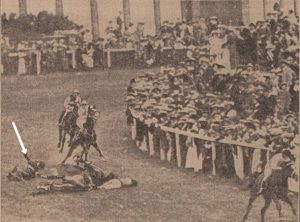
1913 – Emily Wilding Davison was no stranger to fighting battles. A suffragette who fought for votes for women in the United Kingdom in the early twentieth century, she was a member of the Women’s Social and Political Union, was arrested on nine occasions, went on hunger strike seven times, and was force fed on forty-nine occasions. On this date, she made one final attempt to make her point.
She died after being hit by King George V’s horse Anmer at the 1913 Epsom Derby when she ran onto the track during the race. She held in her hands one of the suffragette flags and reached up to the reins of Anmer to attach the flag to its bridle.
She was hit by the animal, which had rounded the final turn and was barreling down the stretch. Anmer fell in the collision and partly rolled over his jockey, who had his foot momentarily caught in the stirrup. Davison was knocked to the ground (see photo) and never regained consciousness. She died four days later.
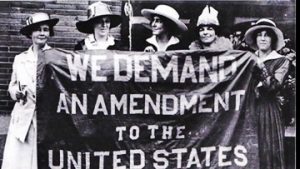
1919 – The 19th Amendment to the U.S. Constitution, which stated that “the rights of citizens of the United States to vote shall not be denied or abridged by the United States or by any State on account of sex,” was passed by Congress and sent to the states for ratification.
On August 18, 1920, Tennessee became the 36th state to ratify the amendment guaranteeing women the right to vote, giving it the two-thirds majority of state ratification necessary to make it the law of the land. Eight days later, the 19th Amendment took effect.
She had not lived long enough to see it, but Susan B. Anthony’s dream had come true.
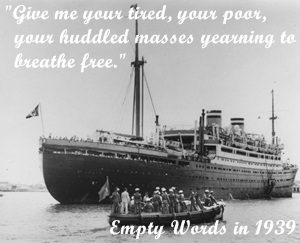
1939 – MS St. Louis, a German ocean liner carrying 963 Jewish refugees, was denied permission to dock in Florida after already being turned away from Cuba.
A group of academics and clergy in Canada tried to persuade Canada’s Prime Minister, William Lyon Mackenzie King, to provide sanctuary to the passengers, but Canadian immigration official Frederick Blair, hostile to Jewish immigration, persuaded the prime minister not to intervene.
The United Kingdom agreed to take 288 of the passengers, who disembarked and traveled to the UK via other ships. Of the remaining St. Louis passengers who returned to continental Europe, 254 were murdered in the killing centers of Auschwitz and Sobibór.

1942 – The Battle of Midway – one of the most decisive U.S. victories against Japan during World War II – began. During the four-day sea-and-air battle, the outnumbered U.S. Pacific Fleet succeeded in destroying four Japanese aircraft carriers of the previously “invincible” Japanese navy.
By the time the battle ended, Japan had lost four carriers, a cruiser and 292 aircraft, and suffered an estimated 2,500 casualties. The U.S. lost the Yorktown, the destroyer USS Hammann, 145 aircraft and suffered approximately 300 casualties.
Japan’s losses hobbled its naval might, bringing Japanese and American sea power to approximate parity and marked the turning point in the Pacific theater of World War II.
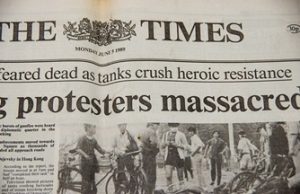
1989 – Chinese troops stormed through Tiananmen Square in the center of Beijing, killing and arresting thousands of pro-democracy protesters. Tens of thousands of the young students tried to escape the rampaging Chinese forces. Other protesters fought back, stoning the attacking troops and overturning and setting fire to military vehicles.
Reporters and Western diplomats on the scene estimated that nearly 300 protesters had been killed and as many as 10,000 were arrested.
U.S. Government files declassified in 2014 estimated the actual number of deaths was substantially higher.
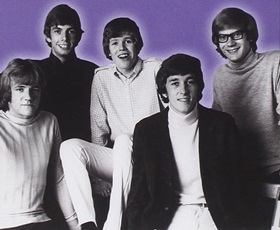
1994 – Derek “Lek” Leckenby, the extremely talented but underrated lead guitarist with Herman’s Hermits, died of non-Hodgkin lymphoma at the age of 51.
Leckenby (far right in the photo above) played on the band’s early hits, but record producer Mickie Most’s use of session musicians on the band’s mid-to-late career hits diminished his stature in the rock world. He deserved a much better fate.
Compiled by Ray Lemire ©2018 RayLemire.com. / Streamingoldies.com. All Rights Reserved.
Really sad that we could have saved almost 1000 refugees in 1939, and just turned them away.
I agree, Pat, and that is exactly why I wrote those words on the photograph. It was a sad day in the history of this country.